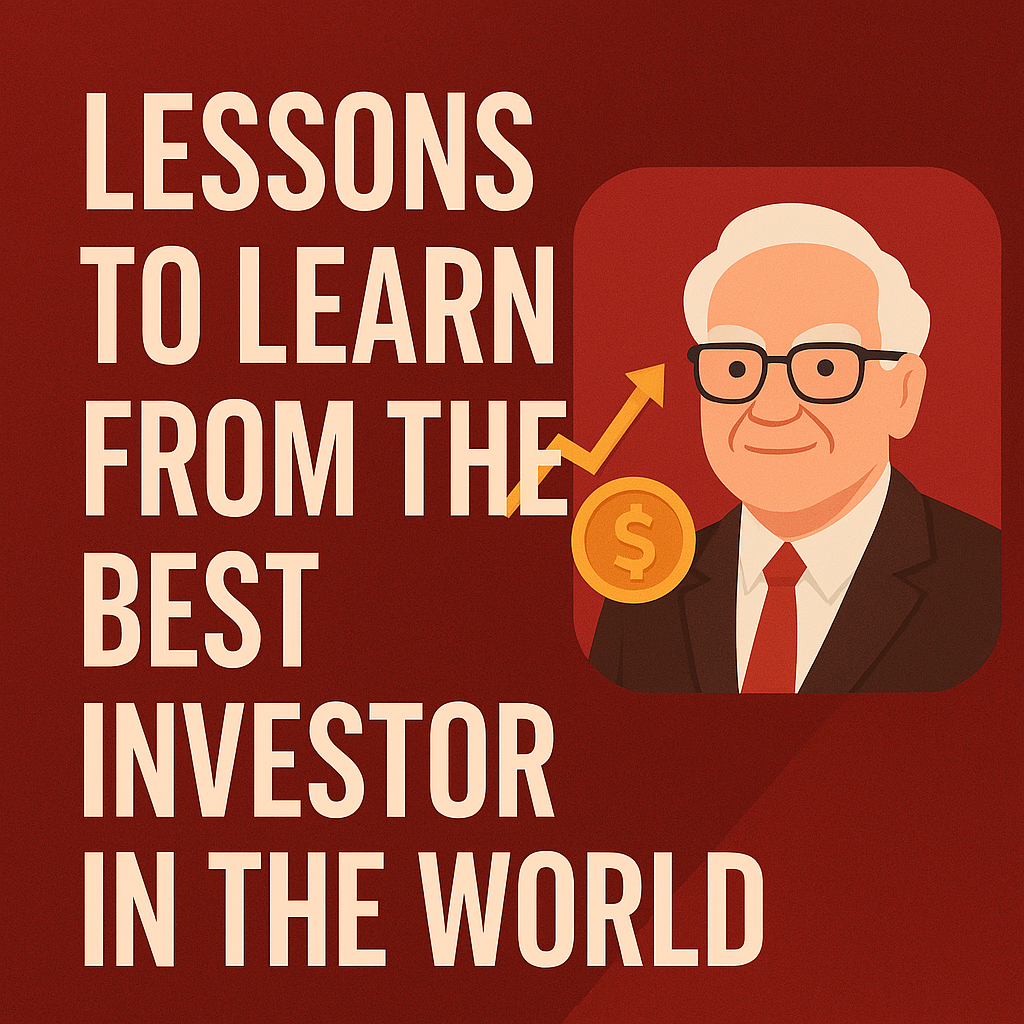When we think of the best investor in the world, one name towers above the rest—Warren Buffett. Often referred to as the “Oracle of Omaha,” Buffett has built one of the largest personal fortunes in history through consistent, long-term investing strategies. More than just accumulating wealth, he’s become a symbol of discipline, patience, and rationality in the world of finance.
Whether you’re a beginner exploring the stock market or a seasoned investor fine-tuning your portfolio, learning from the best investor in the world is a powerful way to sharpen your edge and avoid costly mistakes.
In this post, we’ll dive deep into the core investment lessons that Warren Buffett has exemplified over decades, and explore how you can apply them to your own financial journey and became a wealthy Investor.
Also Read: Metaverse: Steps on How to Take Your Brand Into It
1. Invest in What You Understand
Warren Buffett famously avoids businesses he doesn’t understand—no matter how hyped they may be. From complex tech startups to cryptocurrency trends, he prefers simple, time-tested models he can evaluate confidently.
Key takeaway:
Don’t chase the next hot stock or sector without truly grasping how the business works. Focus on companies with transparent business models, clear revenue streams, and proven value.
“Never invest in a business you cannot understand.” – Warren Buffett
2. Think Long-Term, Not Short-Term
Buffett’s favorite holding period is, as he says, “forever.” He’s not looking to flip stocks for quick profits. Instead, he treats investments like ownership in a business.
Why it matters:
Short-term thinking is often driven by emotion—fear, greed, or media hype. Long-term investing, on the other hand, allows the power of compounding to work its magic.
Compounding is one of the most powerful forces in finance. Reinvested gains over time lead to exponential growth.
3. Buy Businesses, Not Just Stocks

One of Buffett’s core philosophies is to look at stocks as pieces of real businesses, not just ticker symbols or numbers on a screen.
When analyzing an investment, ask:
- Would I buy the whole company if I could?
- Does this business have a competitive edge?
- Will it likely be stronger in 10 years?
This mindset fosters ownership thinking, reducing the urge to panic during market dips.
4. Value Matters: Be Price-Conscious
Buffett is a value investor at heart. He looks for businesses that are underpriced relative to their intrinsic value—a core principle of Benjamin Graham, his mentor.
He doesn’t just buy great companies—he waits until the price is right.
Key indicators he uses:
- Low price-to-earnings (P/E) ratios
- Strong return on equity (ROE)
- Consistent earnings growth
- Low or manageable debt
Lesson:
Buy wonderful companies at fair prices, not fair companies at wonderful prices. Don’t overpay, no matter how shiny the brand.
5. Patience Is a Superpower
Buffett often spends months—or even years—doing nothing in terms of buying or selling stocks. He’s a master of strategic inactivity.
Why?
Because investing isn’t about being busy. It’s about being right.
“The stock market is a device for transferring money from the impatient to the patient.”
In a world addicted to fast results, this lesson is more relevant than ever.
6. Avoid Debt Like the Plague
Although leverage can amplify gains, it also magnifies losses. Buffett keeps debt to a minimum, both personally and within his companies.
Why this works:
During downturns, debt-ridden investors and businesses often face disaster. Cash-rich, debt-light investors survive—and thrive—by buying undervalued assets when others are forced to sell.
7. Master the Emotional Game

If investing were purely logical, computers would dominate the markets entirely. But humans are emotional. Fear and greed cloud judgment.
Buffett succeeds not just because of financial knowledge, but because of emotional discipline. He stays calm when others panic and cautious when others get euphoric.
Timeless quote:
“Be fearful when others are greedy, and greedy when others are fearful.”
8. Reinvest Your Earnings
One of Buffett’s biggest wealth-building habits is reinvesting profits. Rather than cashing out gains for lifestyle upgrades, he compounds wealth by putting money back to work.
This lesson applies to all income streams:
- Reinvest dividends
- Reinvest business profits
- Reinvest windfalls
This creates a snowball effect of growth.
9. Build a Margin of Safety
The idea of a “margin of safety” means buying with a cushion—paying less than what you think the asset is truly worth. If you’re wrong, your downside is limited.
Buffett uses this concept religiously. Even great businesses can be poor investments if bought at inflated prices.
How to build your margin:
- Buy at a discount
- Diversify
- Avoid high-risk speculation
This principle is key to protecting capital—an underrated but essential goal in investing.
10. Read. A Lot.
Buffett reportedly reads 500+ pages a day, including financial statements, news articles, and annual reports. He credits much of his success to continual learning.
Reading develops:
- Market insight
- Pattern recognition
- A deeper understanding of industries and economies
You don’t need to match his pace, but daily learning is a common thread among the most successful investors.
Bonus Lesson: Simplicity Beats Complexity
Many investors try to outsmart the market with complex strategies, frequent trades, or technical gimmicks. Buffett keeps it simple:
- Find good businesses
- Buy at a good price
- Hold for a long time
His approach proves that simplicity, executed with discipline, often outperforms complexity over the long run.
How You Can Apply These Lessons in Real Life
Here are practical ways you can integrate Buffett’s wisdom into your financial strategy:
- Start investing early – Let compounding work its magic.
- Educate yourself – Read investing books, financial news, and annual reports.
- Track your emotions – Create an investing journal to analyze decisions.
- Build a watchlist – Follow businesses you understand and admire.
- Be patient – Avoid FOMO and stay focused on long-term goals.
- Avoid unnecessary risks – Skip the speculative plays and stick to fundamentals.
- Review your portfolio regularly – But don’t overreact to noise.
Final Thoughts: The Greatest Investment is in Discipline
The world’s best investor didn’t get rich overnight. Buffett’s success is a product of time-tested principles, sound decision-making, and emotional control.
These lessons aren’t just useful for building wealth—they’re valuable life lessons rooted in logic, humility, and patience.
If you want to be an investor like Warren Buffett, don’t just copy his stock picks. Embrace his mindset. Develop his habits. And remember: slow, steady, and smart beats fast and flashy every time.


